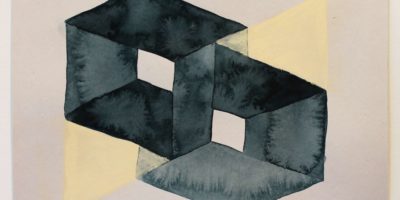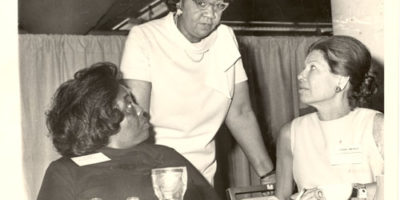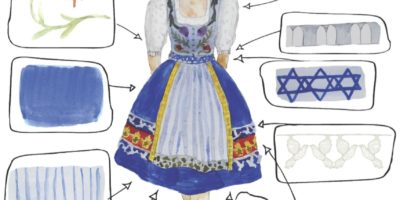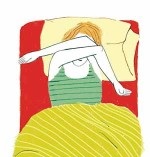
How Not to Trust
Lessons from Male Relatives
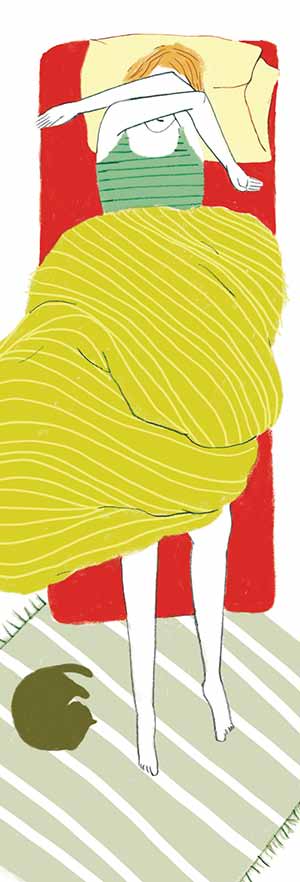
Illustration by Hila Peleg
When I was 12, I courted my uncle. Every Friday after school I marched down Waterloo Place past Jamaica Bay, Queens, the stench of rotting seaweed making me long for a real beach, one with pristine sand and washed up treasure. When I got to my uncle’s house, I pulled off his polished loafers and his rayon socks, the latter damp and smelling like a decomposing plum I had once discovered at the bottom of my book bag. He lay in his leather recliner and I sank into the shag carpet, pushing my thumbs into the fleshy balls of his feet until he groaned.
My aunt was in the next room, shaking chicken parts in a bag filled with stale breadcrumbs. Occasionally she shouted out encouragement. They had no children of their own.
“Rocks, you’re the best,” he said, using the nickname he had adopted for me, as he slipped his loafers back on.
I couldn’t get that kind of attention at home. I believe my father slept in a pair of black dress shoes, at least I had never seen him without them. He would sit in his high-backed chair, grey suit buttoned, the watery remains of his scotch sweating on the tablecloth, his head lost in a book, The Story of Civilization, by Will and Ariel Durant, or the Torah, by God. Eleven fat volumes, the Durant kept him from discovering that my three sisters and I were becoming women, our breasts inflating like the challah our mother baked every Friday, our faces erupting in flame-like boils. When I couldn’t stand his silence any longer, I did somersaults, juggled oranges, and read elaborate poems I had written. Once, he looked up, and I waited for him to compliment my artistry.
“More ice,” he said, holding out his glass.
He disappeared for weeks, sometimes months at a time. Even my mother didn’t know where he went. She was so trusting of him she never asked, and so under his spell she hypothesized he had secluded himself to engage in study and meditation. Other times she claimed he was in Albany on business. We believed her for a while. But then questions arose. If he was in a hotel in Albany, why couldn’t we call him? If he was traveling, why hadn’t he taken his suitcase? I wondered if I had done something to make him go and I resolved to be perfect when he came back.
I always knew, though, where to find my aunt and uncle. My aunt had a crooked back and I’d press on her hump as if I could pull off a miracle, melting it back into her spine. “That’s it, Rocky. Higher. Higher. To the right. Lower. Lower. That’s it! That’s it!” I worried that the neighbors would hear her screams and call the police.
In addition to manipulating their flesh, I vacuumed and mopped their house for three dollars a week. They threw in a Hershey bar and a Coke. The going rate for housecleaning in 1974 was a lot higher, but the joke was on them. I would have done it for the Hershey bar.
When he was home, my father occasionally met in the evening with the men of our extended family to study Torah. He was an ordained rabbi, although one without a congregation. I begged to be included. No women were allowed, but they humored me, because I was not yet fully a woman. I perched on a footstool, shivering in my pajamas, hopping up now and then to help my mother. With other men in the house, my father was animated, shouting in Yiddish, his hands fluttering like bats at dusk. I served rugelach and black tea with lumps of sugar. I developed a crick in my neck, turning from my uncle to my father. My cheeks ached from smiling. When my uncle rose to leave, I embraced him in a bear hug, lifting up on my toes. But I miscalculated. Barely dressed, I felt shame as my breasts flopped beneath my pajama top and rubbed against his chest.
I sometimes wondered if my father would have preferred male children who could lead the prayers in the synagogue and who as infants would have shared in the covenant of Abraham, their foreskin cut at a celebration where whitefish salad was served. For years, I prayed every night to wake up the next morning a boy. At age 12, I managed to get hand-me-downs from a boy cousin and stuffed my hips and bottom into the narrow jeans, telling myself that breathing was overrated. I started peeing standing up, through a funnel I had found in the kitchen. I cut my hair in a bob. I did all this to win my father’s affection, but when I presented myself in my new costume, the effect wasn’t what I had hoped for.
“Halloween isn’t until next month,” he said, pouring himself a scotch.
He would disappear into my parents’ bedroom. The room was crowded with a giant oak desk that nobody used. A large air conditioner dripped dirty water on the carpet. Two single beds had been pushed together to pass for a double. They were covered with bedspreads made from material discovered by NASA, stuff that was incapable of wrinkling.
One Saturday, I pressed my ear against the hollow bedroom door and was surprised to hear the voice of a radio announcer, tinny and upbeat. I told myself I was mistaken. As Orthodox Jews, we didn’t listen to the radio on the Sabbath. Eavesdropping on another Saturday, I heard my father talking on the phone. The telephone was forbidden on the Sabbath as well. He had stopped attending synagogue. My mother intimated that he was too devout for our neighborhood temple. But over time I realized that although he pretended to observe the commandments, behind our backs he did as he pleased.
I awoke one Sunday in the pre-dawn hours when I heard him leaving. I wrapped myself around his thigh as he descended the concrete stoop to the sidewalk. He asked me to fetch the Durant. I was thrilled to be useful, but by the time I gathered all 11 volumes he was gone.
Not long after, on a Friday night, our family gathered at my grandparents’ home. After we blessed the Lord and ate brisket, my uncle led me upstairs to a dark room. He asked me to rub his back and he lay on his stomach, sinking into a cheap cotton bedspread that smelled like Keri Lotion. I sat on the edge of the bed, yanking at loose threads, unraveling the cover’s paisley design. I was afraid in the dark, but not as I had been as a child, when bedspreads turned into sharks and ogres. I sensed something ominous, but never having encountered it before, I didn’t immediately recognize what it was. I bent over and kneaded my uncle’s shoulder blades and pressed my thumbs into the muscles that ran along his spine. He sank deeper into the bed and moaned.
After a while he sat up and slid close to me, his musk aftershave crop-dusting my lungs. He rubbed my neck, his fingers chapped and damp. “Relax,” he said. I was too scared to move. He stroked my hair and caressed it between his fingers and thumb. Like a blow-up doll I had seen on TV, I remained immobile, a plastic version of myself. “Relax,” he said again, as he caressed my head in his hand. I ran from the room.
Downstairs my parents were eating chocolate babka.
“We have to go,” I said.
They looked at each other and my father shrugged as if to say, “Where’s the pogrom?” but they put their coats on.
We walked to the end of the block. Blazing street lamps wiped out the sky. My insides were scalding. “He was trying to molest me.”
“Are you sure?” my father asked. He looked wistfully at his hands, hoping to find a book, I suppose, but they were empty.
“Maybe he was being nice,” my
mother said.
“Wrong kind of nice.”
True to form, my father didn’t stand up for me. He never confronted my uncle who continued to come to our house for Torah study and Friday night dinners. It took decades for me to forgive my father’s cowardice. The incident taught me, though, that being my father’s daughter wasn’t the worst thing. My father had never tried to molest me. Faced with his deceptions — his secret life, his early morning exits, his sham religion — I had developed a sense for corruption, an instinct that saved me when my uncle put his hands on me. Having learned not to trust my father, I knew not to trust my uncle when his behavior turned dangerous.
After that night, I turned away from men and back to boys who gave me gold-plated earrings and took me to amusement parks where we rode roller coasters and I threw up the lunch they had bought me. These boys never forced themselves on me or even once asked for a foot massage.
Yet within a few years, I renewed my search for a father substitute: an older man, preferably uncaring. I slept with most of the candidates who didn’t spend the night or call the next day or send flowers. But they weren’t rapists. I had developed an instinct for men who preyed on weakness, and I learned to avoid them.
Today when I hear about a woman raped by an uncle or a brother or a cousin, I realize how fortunate I was to escape. I take a moment to consider: Men aren’t always what they seem, and often you have no one but yourself to protect you. Sometimes that’s enough.
Rachel Maizes is an attorney in Boulder, Colorado. Her fiction has appeared in Slice Magazine, Blackbird, The MacGuffin, The Barcelona Review, and elsewhere.

